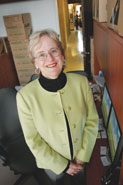Tapping into the information treasure trove
Tapping into the information treasure trove McGill University
User Tools (skip):
Tapping into the information treasure trove
Statistics Canada Data Laboratory at McGill
One of the most secure places on campus could very well be the new Data Laboratory in Peterson Hall, due to open at the end of February. This will be one of a string of secure computer labs at universities across the country, accessible to scholars who rely on statistical data to draw connections, challenge clichés, and discover unexpected social links in the lives of Canadians.

Le Bourdais believes good data is key to constructive public policy.
Owen Egan
Swipe cards and deadbolts will protect the computers and their reams of data taken from different surveys across Canada. These surveys are done every couple of years or so, on roughly 20,000 to 30,000 people, some up to 60,000 - and even as many as 130,000 for the Canadian Community Health Survey. Though some might follow the same respondents for six years, others go on for much longer. In any case, that's a lot of personal information to keep out of the wrong hands. And a goldmine for McGill researchers.
Hitting the stats jackpot
Céline Le Bourdais, Canada Research Chair in Social Statistics and Family Change, is the academic director of the new crucial tool. She's also the director of Quebec Inter-University Centre for Social Statistics (QICSS), which is made up of seven Quebec universities. QICSS (pronounced "kicks"), funded by the Fonds québécois pour la recherche sur la société et la culture, is the main entryway in the province to this bounty of data, and will train students and researchers how to properly analyze it, as well as provide onsite statistical expertise.
Previously, when people wanted to research the carefully guarded data gathered by Statistics Canada, they had to travel to Ottawa. This was so inconvenient, that it effectively meant that no one was using the rich information gathered in these very expensive surveys.
Le Bourdais explained that in the early 1990s, the federal government realized that to develop informed social policy they needed good data. Three major panel surveys were started soon after, on health, labour and children. For the data to be worth the effort of gathering, the information must be more widely accessible to sound researchers. Enter the project, led by QICSS, to open Research Data Centres across Canada, eligible for Canada Foundation for Innovation funding. McGill's centre will be a branch of the QICCS headquarters at Université de Montréal.
Le Bourdais fell into statistics during her final year studying sociology at Brown University. A stats course looked at the event history of peoples' lives - marriage, death, and giving birth, among other social phenomena.
After her studies, Le Bourdais joined the Institut national de la recherche scientifique (INRS) as a professor for over two decades before joining McGill in 2004.
Demographic upheaval
Think of the changes Canada's undergone since the '60s - more effective birth control meant birth rates went down. Change in divorce law meant divorce rates went up. And the 80s saw a rise in single parent households, one of Le Bourdais' many areas of research.
But single parent households aren't static entities. People remarry. Blended families form, joint custody in which children split their time between households is far more common than before. With step-parents added in, is it a two-parent family, or a four-parent family? Do you count family from the point of view of the children or the parents? This is the kind of slippery situation that's difficult to accurately measure. "Stepfamilies are messy to study," Le Bourdais said.
And messy to manage. Le Bourdais recently gave a talk at Ste Justine Hospital for children. One result of blended families is that doctors have to give instructions to many different adults - the father, mother, stepmother, stepfather. Any one of these parents could be accompanying the child at any given time, and not necessarily communicating with other parents. Ditto in schools. Teachers don't know which household to send notes home to.
But once scholars are able to identify areas of change faster, governments will be able to understand the needs of a society in flux. This knowledge will lead to better tools to shape our country's policies.
McGill's data lab belongs to the Quebec Research Data Centre, which is jointly funded by Statistics Canada, Social Sciences and Humanities Research Council (SSHRC), and the Canadian Institutes for Health research (CIHR). The lab received funding from the Canadian Foundation for Innovation (CFI).

